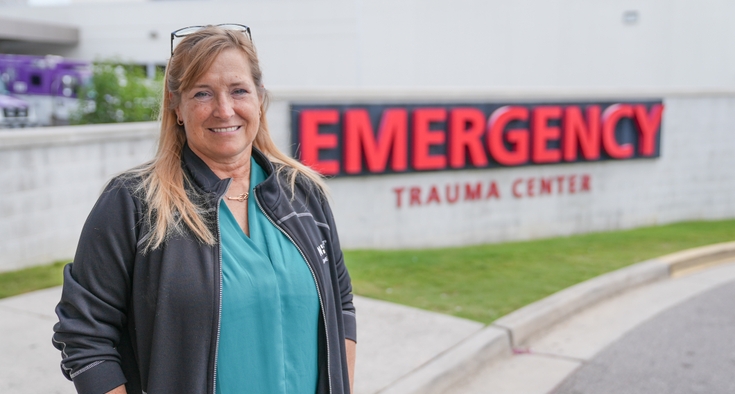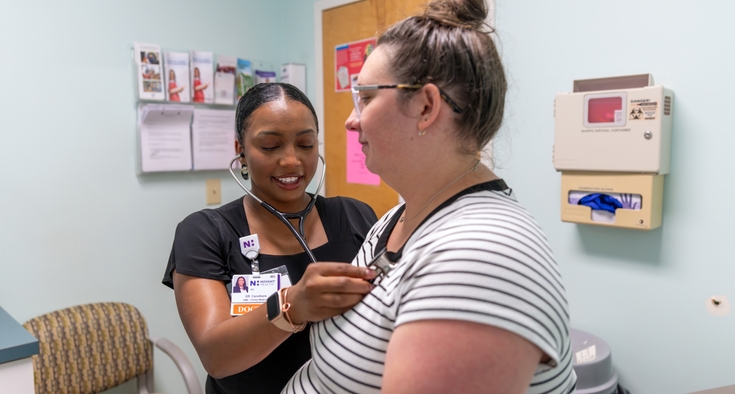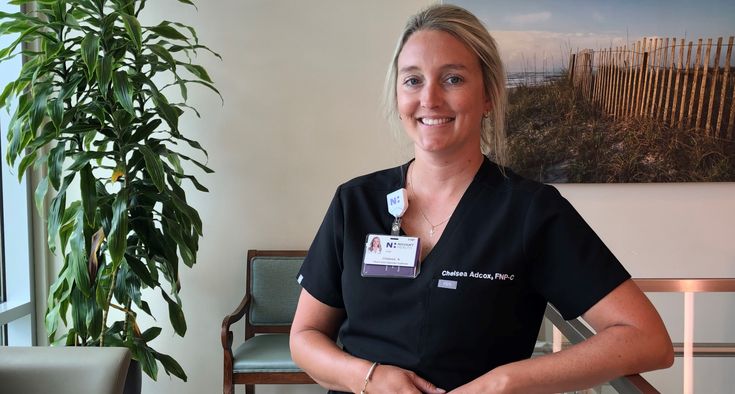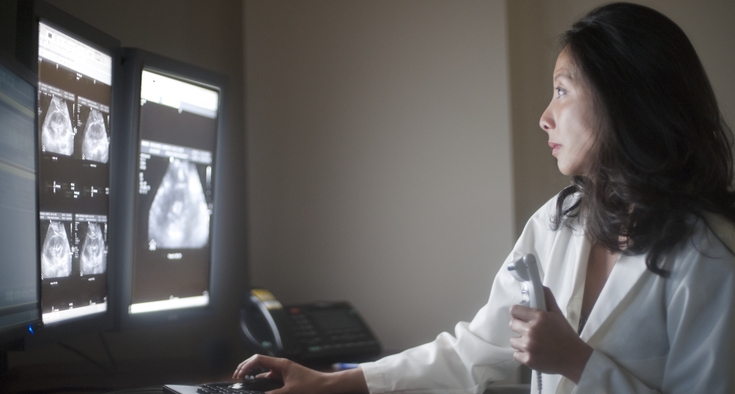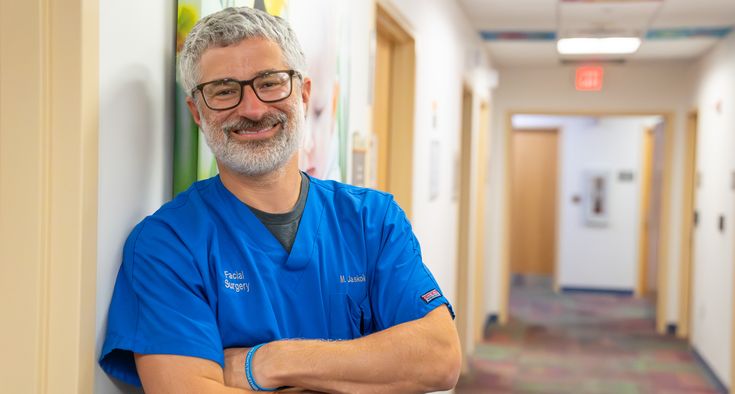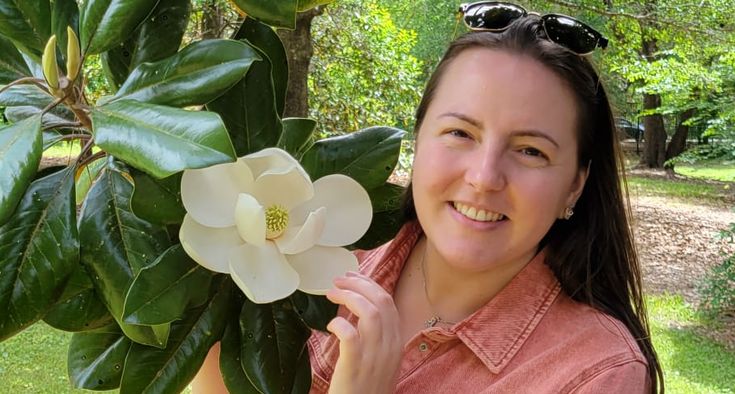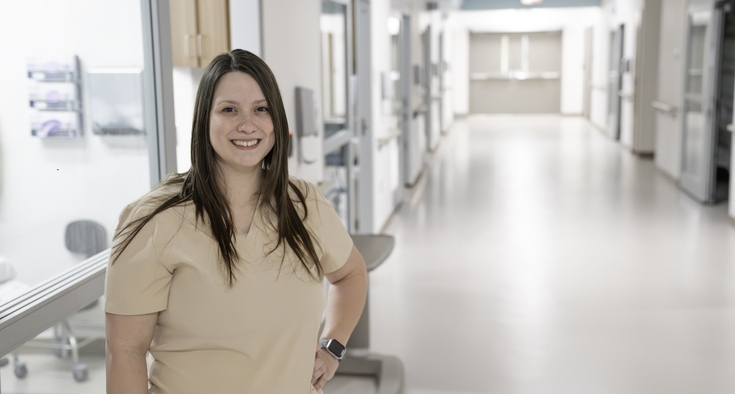Trigger warning: This article discusses violent crimes including sexual assault.
In Wilmington, trauma survivors have allies at Novant Health New Hanover Regional Medical Center.
Denise Riccobon is the sexual assault nurse examiner (SANE) coordinator for Novant Health’s Coastal region, and she and her team of 17 nurses are specially trained to help patients by providing compassionate, safe medical and forensic care following a violent crime. Sadly, these cases aren’t rare. Last year, the program treated 384 survivors.
Some victims of violent crimes are reluctant to go to the hospital for fear of being retraumatized. Riccobon wants them to know: “We have people specially trained to take care of you, and we have a lot of compassion for what you’re going through.”
The SANE program began in the U.S. in the 1970s to provide trauma-informed medical forensic examinations to patients who have experienced sexual assault. Today, there are some 1,000 SANE programs at hospitals across the United States. And a 2023 study found that patients who received help from a SANE nurse were more frequently offered – and accepted – services and resources for specialized care following a traumatic event.
SANE nurses are on call 24/7. And they’re prepared to spend as much time with survivors as needed. They’re often with patients for four or more hours.
That’s in part because while they provide medical care, they’re also collecting evidence and preserving it for potential legal proceedings. The SANE team responds to collect evidence when requested by the patient, law enforcement, the Department of Social Services (DSS) or a member of the patient’s health care team. The reasons patients seek out medical care vary, and may include interpersonal violence, non-fatal strangulation, human trafficking, child abuse or elder abuse.
“Law enforcement is trained to collect certain swabs, and CSI only does on-the-scene evidence collection. They don’t have the ability, or in some cases the training, to collect evidence in sexual assault or child abuse cases,” Riccobon (Ri-CO-bahn) said.
Riccobon took on the role in 2022 because, she said, “I want my community to be a safe place to live.”
Confidential and compassionate care.
Lt. Christina Starman, a 17-year veteran of the New Hanover County Sheriff’s Office, sees the SANE team’s compassion firsthand. Her agency works closely with the SANE nurses, and she works at Wilmington’s new Community Justice Center, an organization that aims to eliminate confusing and intimidating aspects of the criminal justice system for people in crisis.
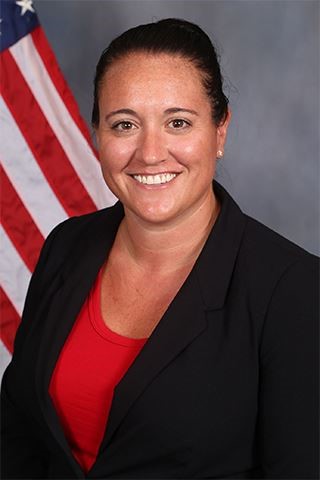
Individuals who have been assaulted, including in some cases by a family member, are left reeling, so responding officers work to return a sense of control to the victim.
“We always try to educate and encourage the victim of any sexual assault or intimate partner violence to seek medical care,” Starman said. “However, we ensure they are the ones making decisions about whether to seek medical care.”
If something very serious – like strangulation – has happened, officers will encourage survivors to get medical attention quickly.
Invisible wounds
Thanks to Riccobon’s training, several Wilmington organizations are now more attuned to what survivors need.
These organizations include the New Hanover County Sheriff’s Office, Wilmington Police Department, University of North Carolina - Wilmington police department, community paramedics and Cape Fear Community College nursing students.
Riccobon has helped law enforcement know the right questions to ask when it comes to nonfatal strangulation cases. Detectives make victims aware of the long-term health risks – including stroke and brain damage from lack of oxygen – that can arise.
Contrary to what many might assume, there’s visible evidence of strangulation in only 15% of cases. Trained law enforcement officers now know that not seeing marks on a victim’s neck doesn’t mean their story is fabricated. Instead of examining their neck, they now ask: Have you noticed any vocal changes? Did your vision change? Did your hearing change?
The training has made a difference. “Like any profession, law enforcement continues to learn, grow and adapt to better meet the needs of the community,” Starman said. “We regularly look back at the cases we handle to see what went well and what we could do better. It’s part of how we improve – not just individually, but as a team and as a profession. Officers today respond to calls with a different mindset than they did five or 10 years ago. There’s more focus on communication, empathy and understanding the bigger picture of what someone might be going through.”
‘Just believe’
Both adults and children who have been assaulted need empathy.
“But traditionally, when law enforcement responded, the first question sometimes was: ‘Did that really happen?’” Riccobon said. “That question never comes up after a car accident or a break-in at your house.”
Riccobon tells law enforcement the most important thing they can do is: “Just believe.”
“In those first few minutes, that first hour, believe them,” she said. “If, through the course of the next week or two, you find that somebody lied, deal with it then. But in that first contact, our rule is to believe.”
Starman advocates for that approach, too.
“There’s a difference in believing and proving what happened,” she said. “During our investigation, we gather all relevant facts and consult with the district attorney’s office to determine whether there is sufficient evidence to proceed with criminal charges. In some cases, it’s determined that we do not have enough to move forward in the criminal process. However, we don’t simply close the case and walk away. We make sure the victim is informed and connected to local services to help them navigate the trauma they’ve experienced.”
Knowing the right questions to ask and paying keen attention to the answers is also key to identify instances of human trafficking, which Riccobon sees daily. While the phrase “human trafficking” often refers to sexual abuse, it can also refer to forced labor. Because of how trafficking works – through means of coercion, force or fraud –most victims do not identify their experience as trafficking until after the situation is over.
An ambulance recently brought to the ER a 19-year-old person who’d fallen off a roof while doing construction work. Riccobon asked the patient the standard questions, including: How many people live in the house where you stay? Do you sleep on the floor? Can you call your family if you want to?
“The patient's answers were indicative of human trafficking,” she said. “But when we asked: ‘Is this a situation you’d like to get out of? Would you like us to call law enforcement?’ the patient said, ‘No. I agreed to this.’”
Training and empowering
Riccobon has brought in forensic teaching experts to instruct people on the correct language to use. Rather than asking a victim, “I heard you were strangled,” a more sensitive way to phrase that is: “I understand somebody put their hands on you. Can you show me how that happened?”
“Words like ‘hit’ and ‘assault’ aren’t what a patient wants to hear,” Riccobon said. “Learning those small language tips and even getting on or below eye level with your patient is helpful; it puts them in a position of power.”
These seemingly small things are having a big impact. For instance, law enforcement recently asked a survivor of abuse if she wanted a ride to the hospital or would rather drive herself. She chose the former.
Once at the hospital, she told a SANE nurse, “If I’d driven myself, I would’ve driven off the bridge.”
Initially, that survivor wanted her evidence collection kit submitted to the crime lab anonymously. But after spending a few hours with a SANE nurse, she decided to press charges.
“She told law enforcement, ‘I feel empowered now, and that’s not what I felt when this happened,’” Riccobon said. “That’s huge. I don't know what will happen with her case in the judicial system, but the fact that she’s pursuing it – that, to me, is success.”
It’s more than a job to Denise Riccobon
Emotionally intense work is ‘a calling’ for this nurse
Denise Riccobon has been in her job – sexual assault nurse examiner (SANE) coordinator for Novant Health’s Coastal region – since November 2022. And in that short time, she’s already won a prestigious national award for her work in victim advocacy.
The Morton Bard Award is presented annually by the National Organization for Victim Advocacy (NOVA) to someone in an “allied” profession such as law enforcement, prosecution, medicine, mental health and the clergy.
Riccobon went to Washington, D.C., to accept the award July 22 after being nominated by some of the community partners she collaborates with on behalf of victims.
She’s been a nurse since 2001 and worked in several specialties, including the ER. She completed SANE training in the summer of 2022 and began her new job soon after. She’s been tireless in her advocacy ever since.
Working with trauma victims is itself traumatic, so a support system is crucial.
The rape crisis advocacy center offers a secondary trauma survivors group that SANE nurses can attend. In addition, Riccobon checks in with her team members often. If they need to talk, they know her office is open. She also sends surveys to ask team members about their emotional state. If anyone needs support, she’ll help them get it.
And since she’s looking out for her patients and her staff, she has to be sure she cares for herself, too.

Going to therapy helps her deal with the heaviness of her work. Yet, she discovered that “some therapists can’t even handle this. The first two or three therapists I tried after I started this work, were like, ‘I can’t help you; I can’t handle what I’m hearing.’”
Now, she’s found the right therapist.
And she has a hobby that helps – skydiving. “If I really need to go let something off, I'll just get on a plane and jump out. I spend a lot of time at the indoor skydiving tunnel. That's my pressure release.”
Being airborne helps keep her grounded for her patients. “Our survivors deserve the best we have to give them,” she said. “I will show up for that every day that I can. It's an honor and privilege to do this work. This work is a calling, and somehow, I got the call.”





